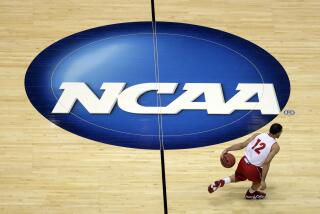NCAA’s Perks Getting Probed
- Share via
KANSAS CITY, Mo. — At the same time the NCAA was punishing college athletes for accepting outside gifts or favors, the boss of the NCAA was enjoying a free trip to the Winter Olympics, courtesy of CBS.
The Kansas City Star reported Sunday that favors and perks tend to proliferate among NCAA executives as well as high-dollar college coaches.
The report is the second installment of a six-part series on the NCAA.
The ruling body of college sports avoids state, county and federal income taxes by claiming that it is nothing more than an educational institution.
But the Star noted that in July 1996, the Taxpayers Bill of Rights went into effect, giving the IRS more options in the cases of nonprofit employees who personally benefit from their positions.
“It sounds to me as though the NCAA might be one of the first cases the IRS might want to look into,” said Daniel Langan of the National Charities Information Bureau.
NCAA ethics policy prohibits officials from accepting expensive gifts or free long-distance travel from companies interested in doing business with them. But the Star reported the organization’s executive director, Cedric Dempsey, went to Lillehammer, Norway, in February 1994 on CBS. NCAA spokesman Wally Renfro said no rules were broken.
CBS already had an agreement with the NCAA and, Renfro said, the NCAA tried to reimburse CBS for the trip but the network refused. Although Renfro said CBS was not bidding for NCAA business, 10 months later the network got a contract extension by paying a record $1.725 billion for rights to the men’s basketball tournament.
Joseph Crowley, former president of the NCAA, cited the nearly $2-billion CBS deal as proof that Dempsey was worth a big loss the NCAA took on his house.
Dempsey was director of athletics at Arizona when he was hired to replace Dick Schultz as NCAA executive director in 1993. The NCAA gave Dempsey a $450,000 mortgage at below-market interest rates for his current home in a fashionable Kansas City suburb.
Then, after putting his Tucson house on the market for $750,000, Dempsey wound up selling it to the NCAA for $685,000. Two years later, the NCAA unloaded the property for a loss of more than $120,000.
“Oh dear, you mean they bought his old house and also gave him a loan to buy a new one? That is not the most helpful position for them to be in,” said Frances Hill, University of Miami law professor and expert on nonprofits.
Said Harvey Dale, director of the National Center on Philanthropy and the Law: “If there has been an excessive payment to someone who is in control, they could be taking a serious risk of losing their tax status.”
Dempsey’s salary last year, including benefits and deferred compensation, amounted to $440,000, not including access to a $52,841 expense account. His pay easily outstrips that of many chiefs of large service organizations, such as American Red Cross head Elizabeth Dole ($204,400) or the American Cancer Society’s John Seffrin ($293,700) in 1995, the Star said.
But Dempsey is not alone among college sports officials when it comes to raking in money and privileges. The Star writes extensively of the apparent private uses of the NCAA’s tax-exempt $1.7 million Learjet which Schultz made.
As an example of extravagant income for coaches, the Star cited Georgetown basketball Coach John Thompson. He owns or has options on 80,000 shares of Nike stock, worth an estimated $4.2 million, and the shoe company paid Thompson’s company $368,000 this year for “services rendered pursuant to an endorsement contract,” according to a Nike prospectus.
More to Read
Go beyond the scoreboard
Get the latest on L.A.'s teams in the daily Sports Report newsletter.
You may occasionally receive promotional content from the Los Angeles Times.










